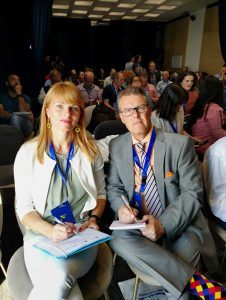Pro-VET at the West Balkans Cluster Meeting in Albania
In cooperation with our project’s Executive Agency, the EACEA, Albania’s National Erasmus+ Office (NEO) arranged the first ever West Balkans Cluster meeting in Durrës, Albania from 22 to 23 October and invited all Erasmus+ projects to be represented who are active in the region. Accordingly, Project Manager Graham Burns, and Professor Dr Nataša Papić-Blagojević from the Novi Sad School of Business in Serbia represented the Pro-VET project.
The aims of the meeting were to bring together local stakeholders from the Higher Education (HE) sector as well as CBHE projects implemented in Western Balkans (WB) in order to:
- Discuss the EU funded projects/programmes impact on the WB HE sectors in terms of regional cooperation, modernisation, accessibility and internationalisation of the HE
- Provide local/regional visibility to the E+ programme and its funded projects, thereby contributing to maximising their impact
- Facilitate exchanges of good practice, sharing of knowledge and networking of CBHE projects to enhance their quality, impact and sustainability
- Reflect on the actual needs of the HE sectors in WB and on the way the future EU education programme for 2021-2027 could address these needs.

Discussions were held through four workshops to explore the inherent questions within the aims and our Pro-VET representatives offered concrete examples from our own planning processes and experiences working in transnational teams to help further regional cooperation throughout the WB.
Key outcomes of the discussions were:
Key outcomes of the discussions were:
- Political obstacles to regional cooperation and development remain in place throughout the WB region yet there is significant will in the education sector to overcome these.
- Additionally, prejudices at both state level and key individual key actor level still effect cooperation efforts negatively.
- The long-term impacts of CBHE, both from Tempest and Erasmus+ programmes, are clear for all to see; progress, albeit slow, is being made.
Contact information
Graham Burns, project manager,
firstname.lastname@jamk.fi
JAMK University of Applied Sciences, School of Professional Teacher Education
Text by Graham Burns
Photo by Nataša Papić-Blagojević
